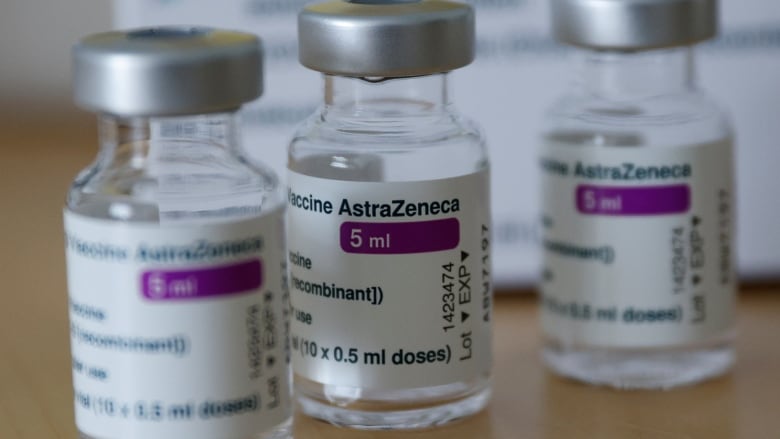Sask. stops giving AstraZeneca as 1st dose over supply issues, considers Pfizer for 2nd
But health minister says it will give out AstraZeneca as a second dose when next shipment arrives

Saskatchewan's chief medical health officer says it's "likely" those who received AstraZeneca-Oxford as their first dose of COVID-19 vaccine could have Pfizer-BioNTech for their second due to supply issues.
Recent studies have shown that following a first dose of AstraZeneca with Pfizer offers "exactly the same level of protection" as a second dose of AstraZeneca, Dr. Saqib Shahab said at the province's COVID-19 update Tuesday.
But Saskatchewan Minister of Health Paul Merriman said Wednesday afternoon that the provinceexpects to get a new shipment of AstraZeneca next week.
"If we get vaccines from the federal government, we will be using them," Merriman said.
Those who received that shot as their first dose will have the opportunityto get a second dose of AstraZeneca.
"We had about 72,000 or 73,000AstraZeneca that were initially put into arms. So we'll be contacting those individuals," Merriman said.
"We haven't got confirmed quantities as of yet. So as soon as we get that, we'll be working through the appointment based system, or probably the drive-thrus, to be able to get those AstraZeneca(into arms) as fast as we can."
Some provinces including Ontario and Alberta have recently pressed pause on delivering the AstraZeneca vaccine. In Alberta, it's also mainly due to supply issues; however,in Ontario, it's because ofthe rare risk of blood clotting.
Dr. Cory Neudorf, a professor at the University of Saskatchewan's department of community health and epidemiology, and a public-health physician, said it's a good idea to stop giving out AstraZenecadoses right now.
Neudorf said we are now getting more and more vaccines, and Pfizer has become the most reliable and abundant inCanada compared to theModerna, AstraZeneca or the Johnson and Johnson vaccines.
"So when you're at a time when you're trying to really accelerate getting first doses out to as many people as possible and then starting to get a sufficient number of people with their second dose so that you can reopen, Pfizer is the one to put your money behind right now."

Neudorf said government's also have to contend with vaccine hesitancy.
"Regardless of the fact that the side effects are still quite rare with AstraZeneca, they'rebeing talked about a lot and it's causing people to perhaps be hesitant to get a first dose of vaccine," he said. "It would be one thing if that was your only option. But when there are other options available that don't have the same concerns, even if they're small, anything that we can do to get people to be less vaccinehesitant and come out and get vaccinated, that needs to be done."
Saskatchewan Health Authority CEO Scott Livingstone maintains the AstraZeneca vaccine is safe and the switching up of second doses comes as supply dwindles.
"Because we're not sure what will be future allocations, we are not currently using AstraZeneca as a first-dose strategy right now," he said, noting Pfizer or Moderna will be offered instead. "We just simply do not have enough of the vaccine in the province."
According to Livingstone, more than 65,000 people in Saskatchewan received the AstraZeneca vaccine as their first dose when it was initially offered in March.
"We have not been offering first dose clinics with AstraZeneca[lately]. It does not mean we would not give it if we had enough doses to do so but we are holding onto those doses now and almost exclusively giving Pfizer and Moderna going forward until we get assurances on AstraZeneca shipments," he said.
Neudorf, who got the AstraZeneca vaccine, said early trials coming out show mixing and matching vaccines is "not only acceptable, but in some cases might actually result in a better immunity response."
"But if the trials had turned out differently and it turns out that I had to get a second dose of AstraZeneca, I would gladly take that."
Neudorf said it is frustrating for the public because messages and rules are changing as we go through the pandemic, but it also means we are going where the science takes us.
"We should consider it a good news that at every step of the waywe're acting on the best science and knowledge of the time. As new evidence emerges, those messages are being adapted and it just means that policymakers are nimble and acting on the best available evidence and are willing to make those shifts as the new evidence emerges."
With files from Scott Larson












_(720p).jpg)


 OFFICIAL HD MUSIC VIDEO.jpg)
.jpg)



























































































